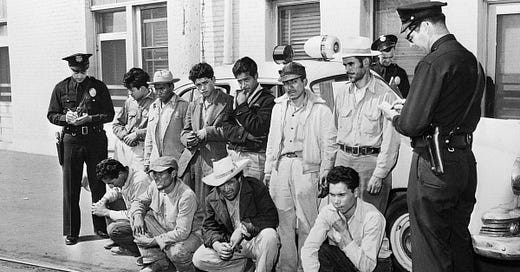In After Ten Years, Bonhoeffer asks “Who stands firm?” It’s not the reasonable, the ethical, or the virtuous, and it is not those who appeal to conscience, duty, or freedom. To make sense of what is happening in the world, and to formulate a response, these people end up appealing to something higher, which means they end up in abstraction. You can count on them congratulating themselves for their leadership, but the end result is an abdication of responsibility.
For Bonhoeffer, the crisis facing the Christian community was the rise of Nazis and their infiltration into every part of cultural life. Bonhoeffer saw how high minded principles provided cover for people to recuse themselves from any and all responsibility. This is the problem with abstraction, and this is Bonhoeffer’s opposition to religion. Religion keeps us from getting our hands dirty by over-spiritualizing life. When we focus on some another world, we don’t have to care about this one. This is what allowed Germans Christians to close their eyes to what was happening. They could rationalize it away, or claim some higher duty to God and the state. They could spiritualize their faith, emphasizing how the business of the church is not justice, but helping people get to heaven. This is Bonhoeffer’s problem with religion—it allows us to become irresponsible.
Bonhoeffer’s theology is centered on incarnation. In Jesus Christ God steps out from abstraction into concrete personhood. In the death of Christ on the cross, the old humanity —the humanity that is never content to be human but always wants to be something more—is put to death. In the resurrection of Jesus Christ, we are invited into a new way of being human grounded in grace and love. Everything, for Bonhoeffer, is grounded in this relational identity. We don’t find God in rational doctrines or ethical principles, we discover God in our flesh and blood neighbor. Which is why loving God and loving our neighbor are intertwined. Just as God took on human flesh and entered our experience of suffering and death, we are now called to enter into the concrete experience of our neighbor. Here’s what he writes:
We are not Christ, but if we want to be Christians it means that we are to take part in Christ’s greatness of heart, in the responsible action that in freedom lays hold of the hour and faces the danger, and in the true sympathy that springs forth not from fear but from Christ’s freeing and redeeming love for all who suffer. Inactive waiting and dully looking on are not Christian responses. Christians are called to action and sympathy not through their own firsthand experiences but by the immediate experiences of their brothers, for whose sake Christ suffered. (Letters and Papers from Prison 49)
So what about the Christian community in this country? How will we respond to the plight of our immigrant neighbors in the coming weeks and months? There are signs suggesting the promised mass deportation of immigrants might be broad. It’s being reported that the incoming administration will attempt to repeal a law directing ICE agents away from churches, hospitals, and schools. How will American Christians respond to mass deportation? Will we rationalize is? Dismiss it? Will we over-spiritualize it? Or, will we claim some abstract allegiance to higher principles of duty and rule of law?
Christian faith is not about political party or ideology. Most Christians recognize the need for a country to secure its borders and protect its citizens. For Bonhoeffer, however, the depth of our Christian faith is not found in giving ascent to abstract ideas, it is marked by our love for our concrete neighbor.
Who stands firm? Only the one whose ultimate standard is not his reason, his principles, conscience, freedom, or virtue; only the one who is prepared to sacrifice all of these when, in faith and in relationship to God alone, he is called to obedient and responsible action. Such a person is the responsible one, whose life is to be nothing but a response to God’s question and call. Where are the responsible ones?





Deport pro russians, pro ccp, and those who are actually guilty. (Not the whole group)